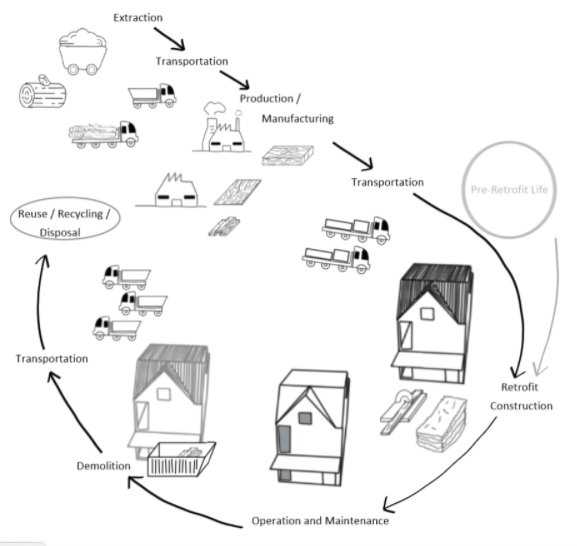MAYA SHIKATANI, MBSc
An Added Dimension For The Cost Of Retrofits: A Social Life Cycle Assessment Of Single-family House Retrofits
Read the full Master Research Paper HERE.
Residential retrofits are a way to make older houses more energy efficient in an effort to decrease emissions. To encourage homeowners to retrofit, governments have implemented financially based programs that have been assessed based on potential to decrease emissions; this leaves the social cost of retrofitting unassessed. The novel application of social life cycle assessment (SLCA) to single-family house archetypes and their retrofit scenarios in Toronto, ON was performed to provide insight into the social and socioeconomic impact of retrofitting on society, occupants and workers. EnergyPlus was used to simulate 26,244 retrofit scenarios and extract energy use, mechanical and geometric data. Based on the partial SLCA, it was found that a maximum of just over 5 years of occupants’ full health were lost, while 4.75 years for society and 16 years for workers were gained by retrofitting. A comparison of recommendations based on SLCA results, heating and cooling energy use intensity (EUI) and cost-benefit showed the need to include social costs in feasibility studies of construction projects. It was found that site specificity in SLCAs go beyond determining thresholds in impact assessment, to influence the breadth of potential impacts that are identified. The importance of audience and stakeholder involvement to increasing the effective use and value of SLCA results was illustrated. Findings contribute to the development of SLCA by providing another instance of application, identification of the difference it could make in decision-making, and the value that unique characteristics like site specificity and stakeholder involvement bring to SLCA results.
An Added Dimension For The Cost Of Retrofits: A Social Life Cycle Assessment Of Single-family House Retrofits
Read the full Master Research Paper HERE.
Residential retrofits are a way to make older houses more energy efficient in an effort to decrease emissions. To encourage homeowners to retrofit, governments have implemented financially based programs that have been assessed based on potential to decrease emissions; this leaves the social cost of retrofitting unassessed. The novel application of social life cycle assessment (SLCA) to single-family house archetypes and their retrofit scenarios in Toronto, ON was performed to provide insight into the social and socioeconomic impact of retrofitting on society, occupants and workers. EnergyPlus was used to simulate 26,244 retrofit scenarios and extract energy use, mechanical and geometric data. Based on the partial SLCA, it was found that a maximum of just over 5 years of occupants’ full health were lost, while 4.75 years for society and 16 years for workers were gained by retrofitting. A comparison of recommendations based on SLCA results, heating and cooling energy use intensity (EUI) and cost-benefit showed the need to include social costs in feasibility studies of construction projects. It was found that site specificity in SLCAs go beyond determining thresholds in impact assessment, to influence the breadth of potential impacts that are identified. The importance of audience and stakeholder involvement to increasing the effective use and value of SLCA results was illustrated. Findings contribute to the development of SLCA by providing another instance of application, identification of the difference it could make in decision-making, and the value that unique characteristics like site specificity and stakeholder involvement bring to SLCA results.
